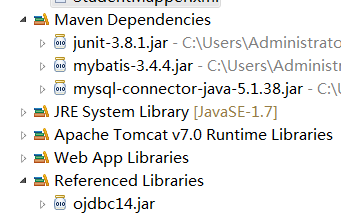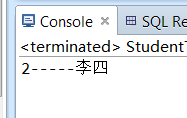MyBatis
是支持普通 SQL查询,存储过程和高级映射的优秀持久层框架。MyBatis 消除了几乎所有的JDBC代码和参数的手工设置以及结果集的检索。MyBatis 使用简单的 XML或注解用于配置和原始映射,将接口和 Java 的POJOs(Plain Ordinary Java Objects,普通的 Java对象)映射成数据库中的记录。
1.首先搭建一个maven项目,引入oracle和mysql配置jar包,本文主要演示mysql

2.在数据库中创建表与数据
CREATE TABLE `student` (
`studentno` int(11) NOT NULL ,
`name` char(10) default NULL,
PRIMARY KEY (`studentno`)
) ENGINE=InnoDB DEFAULT CHARSET=utf8 COMMENT='姓名';
INSERT INTO `student` VALUES ('1', '张三');
INSERT INTO `student` VALUES ('2', '李四');
3.创建表的实体类
public class Student { private int studentno;//学生编号 private String name;//学生姓名 public int getStudentno() { return studentno; } public void setStudentno(int studentno) { this.studentno = studentno; } public String getName() { return name; } public void setName(String name) { this.name = name; } }
4.创建接口StudentMapper和StudentMapper.xml
接口StudentMapper:
public interface StudentMapper { public Student selectStudent(int studentno); }
StudentMapper.xml
<?xml version="1.0" encoding="UTF-8" ?> <!DOCTYPE mapper PUBLIC "-//mybatis.org//DTD Mapper 3.0//EN" "http://mybatis.org/dtd/mybatis-3-mapper.dtd"> <mapper namespace="com.qyxy.mapper.StudentMapper"> <select id="selectStudent" resultType="Student"> select * from student where studentno = #{studentno} </select> </mapper>
注意:接口中的方法和select中id的名字是一致的
5.接数据库的文件db.properties
jdbc.driverClassName=com.mysql.jdbc.Driver//根据自己数据库,自己改 jdbc.url=jdbc:mysql://localhost:3306/hello//根据自己数据库,自己改 jdbc.username=root//根据自己数据库,自己改 jdbc.password=123456//根据自己数据库,自己改
6.配置config.xml文件(mybatis核心)
<?xml version="1.0" encoding="UTF-8" ?> <!DOCTYPE configuration PUBLIC "-//mybatis.org//DTD Config 3.0//EN" "http://mybatis.org/dtd/mybatis-3-config.dtd"> <configuration> <!-- properties属性配置文件的引入 --> <properties resource="db.properties"></properties> <!-- setting设置,调整mybaits运行行为 --> <settings> <!-- 匹配下划线到驼峰式命名法 --> <setting name="mapUnderscoreToCamelCase" value="true"/> <setting name="safeRowBoundsEnabled" value="false"/> <setting name="cacheEnabled" value="true"/> <setting name="lazyLoadingEnabled" value="true"/> <setting name="multipleResultSetsEnabled" value="true"/> <setting name="useColumnLabel" value="true"/> <setting name="useGeneratedKeys" value="false"/> <setting name="autoMappingBehavior" value="PARTIAL"/> <setting name="autoMappingUnknownColumnBehavior" value="WARNING"/> <setting name="defaultExecutorType" value="SIMPLE"/> <setting name="defaultStatementTimeout" value="25"/> <setting name="defaultFetchSize" value="100"/> <setting name="localCacheScope" value="SESSION"/> <setting name="jdbcTypeForNull" value="OTHER"/> <setting name="lazyLoadTriggerMethods" value="equals,clone,hashCode,toString"/> </settings> <!-- 类起别名 --> <typeAliases> <!-- <typeAlias type="com.qyxy.entity.Dept" alias="Dept"/> --> <package name="com.qyxy.entity"/> </typeAliases> <!-- 设置要使用的数据库环境 --> <environments default="mysql"> <environment id="mysql"> <transactionManager type="JDBC" /> <dataSource type="POOLED"> <property name="driver" value="${jdbc.driverClassName}" /> <property name="url" value="${jdbc.url}" /> <property name="username" value="${jdbc.username}" /> <property name="password" value="${jdbc.password}" /> </dataSource> </environment> </environments> <!-- 定义不同的数据库厂商标识 --> <databaseIdProvider type="DB_VENDOR"> <property name="SQL Server" value="sqlserver"/> <property name="DB2" value="db2"/> <property name="Oracle" value="oracle" /> <property name="MySql" value="mysql" /> </databaseIdProvider> <!-- 映射的sql文件 --> <mappers> <mapper resource="StudentMapper.xml" /> </mappers> </configuration>
所有的配置,都已经弄好,下面开始编写测试类测试
7.测试类
public class StudentTest {
public static void main(String[] args) throws IOException {
// 指定mybatis配置文件路径和文件名
String resource = "mybatis-config.xml";
InputStream inputStream = Resources.getResourceAsStream(resource);
SqlSessionFactory sqlSessionFactory = new SqlSessionFactoryBuilder()
.build(inputStream);
SqlSession session = sqlSessionFactory.openSession();
try {
// session.selectOne(配置文件中namespace.id,传入参数的值)
//通过接口,调用方法(接口名和namespace名称保持一致,id和方法名保持一致)
StudentMapper mapper = session.getMapper(StudentMapper.class);
Student student = mapper.selectStudent(2);
System.out.println(student.getStudentno()+"-----"+student.getName());
} finally {
session.close();
}
}
}
8.测试结果:



 posted on
posted on

